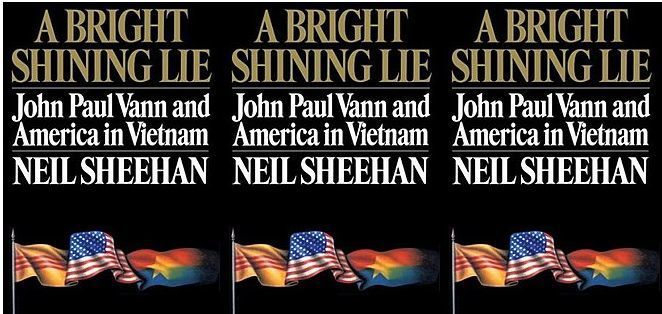
Vietnam’s Lasting Illusion
09/25/2003
Republished by VDARE.com on September 25, 2003
The Times (London) May 13 1989
NEW YORK — Oscar Wilde, in a famous phrase, described fox-hunting as the unspeakable in pursuit of the uneatable. Something similar might be said about the American intelligentsia’s unanimous enthusiasm for A Bright Shining Lie, former New York Times person Neil Sheehan’s ponderous account of America’s involvement in Vietnam as personified by John Paul Vann. He was a US official killed in a helicopter crash days after masterminding the crushing defeat of Hanoi’s 1972 Easter offensive in the central highlands.
Now the book has been published in Britain (Jonathan Cape, £15.95), where I gather the same baying has begun.
This is emphatically a cultural, not a literary, phenomenon. A Bright Shining Lie is technically, intellectually and morally incompetent. Its hysterical reception is a clue to why America failed in Vietnam and why President Bush now hesitates over Panama.
The book suffers, to begin with, from gross, appalling elephantiasis. Its 862 pages contain much formulaic padding, such as detailed physical descriptions of microscopically minor characters like Vann’s father-in-law. But it still contrives to devote only 30 pages to the course of the war from the 1968 Tet offensive to 1972 and nothing at all to the period leading up to Hanoi’s final onslaught in 1975.
This unquestionably serves a political purpose. It allows Sheehan to evade the historical reality that Saigon fell, not because its troops ceased to fight — they fought to the end, without benefit of American media coverage — but because the US, unlike the Soviet Union, reneged on its commitment to supply its ally with the modern means to go on fighting.
Sheehan’s use of space, however, is more irrational. Ultimately it appears dictated by sheer accidents such as his own presence at an early skirmish or his access to an American PoW’s unpublished manuscript. Even before reading the worshipful accounts of Sheehan’s 16-year struggle with writer’s block and his frantic last-minute cutting of some 90,000 words, the mundane reality has become unmistakable: he simply lost control of his material.
Which leads to Sheehan’s crucial intellectual failing: he nowhere gets around to a clear explanation of the military problem in Vietnam. Against what rapidly became a conventional invasion, Saigon had to defend an 800-mile frontier on exterior lines, an almost impossible task. Washington refused to contemplate either a counter-attack against North Vietnam or establishing a shorter line from the demilitarized zone to the Mekong River.
Thus, throughout the war, the North Vietnamese were able to maintain and resupply bases in Cambodia only 50 miles from the South Vietnamese capital. Sheehan never questions this peculiar situation. In fact, he shamelessly repeats the anti-war line that Nixon’s belated thrusts at these cross-border sanctuaries constituted a 'widening of the war' as if the war were not there already.
One result is that Sheehan totally misunderstands his protagonist. Vann originally thought America’s massive use of military force and air power destructive and wasteful, as it certainly was. But it worked.
Sheehan himself notes that after Tet the indigenous Vietcong was destroyed, the population mostly refugees in US-controlled areas, and the communist cause dependent on repeated North Vietnamese invasions. It was to defeat these invasions that Vann sensibly turned to air power — a switch that Sheehan attributes to gathering hubris.
Nowhere in Sheehan’s vast tome is there any suggestion that there might be any reason to resist communism. Anti-communism is invariably ’simplistic' or 'Manichean'. America does not fare so well. It is always, in Jeane Kirkpatrick’s phrase, blamed first.
The Cambodian holocaust which receives a grand total of 10 lines is described as 'the cruellest consequence of the American War in Indochina', although of course it occurred years after the Americans had left. Even the openness of American society is repeatedly depicted in diabolical terms 'the genius of the Anglo-Saxon society of the North-east for co-opting the talents and loyalties of outsiders'.
(Telling terminology. Sheehan, whose mother was reportedly an Irish immigrant, seems to be one of that majority of Irish Americans who are impelled by ethnic antagonism to move to the political left — a supposition supported by his apparent belief in what can only be described as a bar-room ballad version of Irish history.)
Moral blindness is at the core of Sheehan’s narrative. It is symbolized by a small detail. Vann kept two Vietnamese mistresses. He ultimately married one and had a child by her. Sheehan tells the story at prurient length. But he never bothers to report what happened to them when Saigon fell. For the American left, Vietnam was never more than a screen on which they projected their own self-absorbed psycho-drama.
Earlier this year, I published a long essay on the Sheehan syndrome in the conservative (and Irish-American) National Review magazine. It provoked an unusual type of letter: passionately assenting, enclosing similarly hostile reviews from obscure service journals and even private memos, apparently dashed off to relieve the writers' powerless rage. None of this found expression in the establishment media.
The Vietnam war is over. America’s civil war goes on.
The author is a senior editor of Forbes magazine in New York.
[Originally published in England, spelling and grammar vary slightly from American style.]
